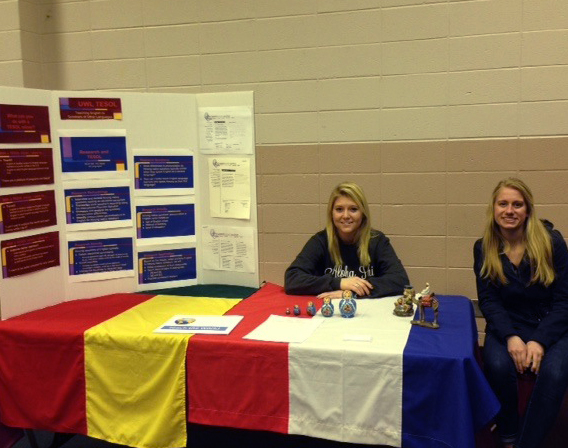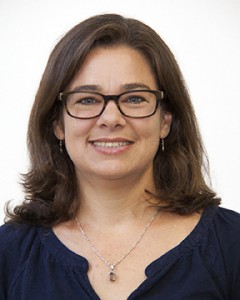Posted 9:49 a.m. Monday, June 15, 2015
Class project improves international language resource.
Class project improves international language resource
[caption id="attachment_41610" align="alignleft" width="568"] During the School of Education spring semester Take a Look Day, UW-L students Lauren Hillman, left, and Kimmy Gaul showcase work done within the Teachers of English to Speakers of Other Languages (TESOL) minor. The goal is to expand the minor at UW-L, a rapidly growing field in the U.S. and abroad.[/caption]
A UW-La Crosse class project improved an international resource for English language pronunciation while educating a UW-L class about Hmong accents.
About 75 percent of students in the spring semester MLG 340: The Study of Language class were Teachers of English to Speakers of Other Languages (TESOL) minors, and will likely be working with English language learners in the future. Heather Linville, the instructor, wanted her students to have a sense of what pronunciation variables exist for Hmong native speakers, a prominent language community in Wisconsin.
“I count myself as someone who doesn’t know a lot about the features of Hmong,” says Linville. “If you’re going to work with a population, you need to know something about the native language of that population.”
[caption id="attachment_41616" align="alignright" width="240"]
During the School of Education spring semester Take a Look Day, UW-L students Lauren Hillman, left, and Kimmy Gaul showcase work done within the Teachers of English to Speakers of Other Languages (TESOL) minor. The goal is to expand the minor at UW-L, a rapidly growing field in the U.S. and abroad.[/caption]
A UW-La Crosse class project improved an international resource for English language pronunciation while educating a UW-L class about Hmong accents.
About 75 percent of students in the spring semester MLG 340: The Study of Language class were Teachers of English to Speakers of Other Languages (TESOL) minors, and will likely be working with English language learners in the future. Heather Linville, the instructor, wanted her students to have a sense of what pronunciation variables exist for Hmong native speakers, a prominent language community in Wisconsin.
“I count myself as someone who doesn’t know a lot about the features of Hmong,” says Linville. “If you’re going to work with a population, you need to know something about the native language of that population.”
[caption id="attachment_41616" align="alignright" width="240"] Heather Linville, assistant professor of TESOL in the Department of Modern Languages.[/caption]
To teach her students about Hmong pronunciation, she looked to the online Speech Accent Archive, an international resource for exploring native and non-native pronunciations of English. However, she found no recordings of Hmong native speakers. So Linville decided to add new recordings of Hmong people speaking English to the archive.
Her students then used the recordings to transcribe, analyze and create pronunciation lessons that could be used to teach Hmong native speakers English.
“It allowed me to not only hear but also see how accents are formed as we wrote out what was said in International Phonetic Alphabet (IPA),” says UW-L Junior Arianna Wirebaugh who plans to teach German. “The IPA is the same throughout the world, so this introduced me to something I will be using throughout my career.”
UW-L student Kimmy Gaul says the research gave her an appreciation for accents. They give a hint about someone's origin and heritage and add diversity to the English langauge, she says.
"So although we want to help the ESL student communicate effectively, we don’t want to necessarily fully eliminate their unique accent characteristics," she says.
Students also became familiar with other accents in the archive. Gaul aims to one day work with Spanish speaking children in the Peace Corps or at a bilingual school. Identifying differences in pronunciation for Hmong speakers and helping these speakers make adjustments to improve communication can be applied when working with other English language learners, she says.
“It opens students up to challenges non-native speakers face,” says Linville. “If you don’t have a particular sound in your native language, it will be harder to say.”
Linville attended a workshop offered through UW-L’s Undergraduate Research and Creativity office and the Center for Advancing Teaching and Learning. The workshop was part of a Regent’s Research, Economic Development and Innovation grant to embed this undergraduate research experience into her course.
Heather Linville, assistant professor of TESOL in the Department of Modern Languages.[/caption]
To teach her students about Hmong pronunciation, she looked to the online Speech Accent Archive, an international resource for exploring native and non-native pronunciations of English. However, she found no recordings of Hmong native speakers. So Linville decided to add new recordings of Hmong people speaking English to the archive.
Her students then used the recordings to transcribe, analyze and create pronunciation lessons that could be used to teach Hmong native speakers English.
“It allowed me to not only hear but also see how accents are formed as we wrote out what was said in International Phonetic Alphabet (IPA),” says UW-L Junior Arianna Wirebaugh who plans to teach German. “The IPA is the same throughout the world, so this introduced me to something I will be using throughout my career.”
UW-L student Kimmy Gaul says the research gave her an appreciation for accents. They give a hint about someone's origin and heritage and add diversity to the English langauge, she says.
"So although we want to help the ESL student communicate effectively, we don’t want to necessarily fully eliminate their unique accent characteristics," she says.
Students also became familiar with other accents in the archive. Gaul aims to one day work with Spanish speaking children in the Peace Corps or at a bilingual school. Identifying differences in pronunciation for Hmong speakers and helping these speakers make adjustments to improve communication can be applied when working with other English language learners, she says.
“It opens students up to challenges non-native speakers face,” says Linville. “If you don’t have a particular sound in your native language, it will be harder to say.”
Linville attended a workshop offered through UW-L’s Undergraduate Research and Creativity office and the Center for Advancing Teaching and Learning. The workshop was part of a Regent’s Research, Economic Development and Innovation grant to embed this undergraduate research experience into her course.
